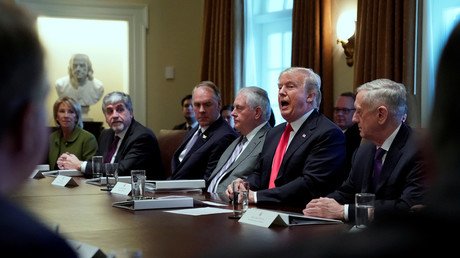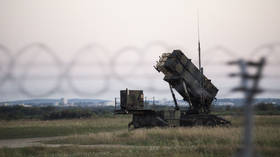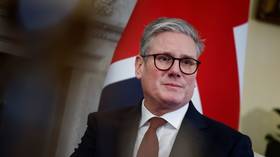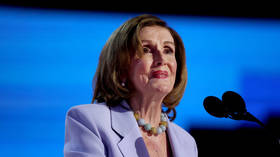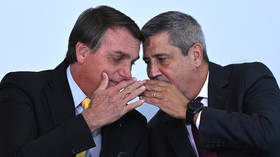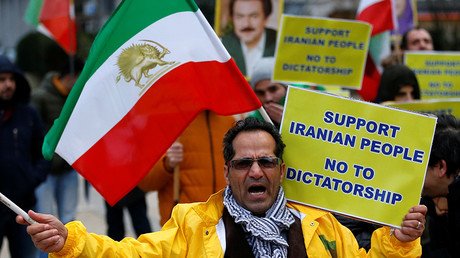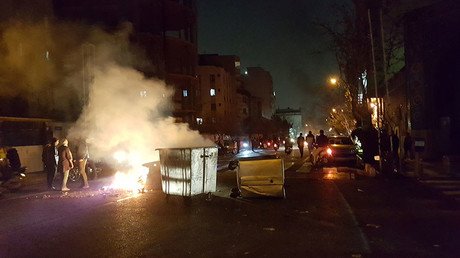'Iran nuclear deal survived year one of Trump’s presidency, can go the distance' – former adviser
The Iran nuclear deal will survive the Trump presidency because it is in the national interest of the US, says a former adviser to Iran’s nuclear negotiation team. Kaveh Afrasiabi says it is a win-win.
On Friday, the Trump administration opted to extend sanctions relief for Iran for another 120 days, a decision that will, for now, prevent the landmark 2015 nuclear deal from falling through.
Iranian Foreign Minister Javad Zarif hit back at Donald Trump for trying to scupper the nuclear deal, saying that “Iran strongly announces that it will make no measure beyond its JCPOA commitments and will make no changes in the nuclear deal either now or in the future.”
Trump's policy & today’s announcement amount to desperate attempts to undermine a solid multilateral agreement, maliciously violating its paras 26, 28 & 29. JCPOA is not renegotiable: rather than repeating tired rhetoric, US must bring itself into full compliance -just like Iran.
— Javad Zarif (@JZarif) January 12, 2018
RT discussed the issue with Kaveh Afrasiabi, a former adviser to Iran’s nuclear negotiation team and author of “Iran Nuclear Accord and the Remaking of the Middle East”.
RT: Why has Trump extended the sanctions relief for Iran if he is so opposed to the deal?
Kaveh Afrasiabi: First of all, a small, yet significant sigh of relief that President Trump ultimately listened to the sound advice of his top advisers as well as the various European leaders by sticking with the deal and not scuttling it as he has repeatedly vowed to do so. So the deal has now survived year one of Trump’s presidency, and my hunch is that it will continue to do so in year two and the remainder of Trump’s presidency, for a good reason – because it is in the national interest of the US, it is a win-win. And it puts to rest international anxieties about Iran’s potential proliferation. And we’ve heard from the various European leaders just a couple of days ago that this is a working deal and IAEA through 9 reports has confirmed that Iran has fully fulfilled its obligations. So, there is really no rationale or justification for Trump to go against the deal and scrap it and really land a big stamp on the US’ credibility on the international scene.
Most political observers complain that they don’t understand what Trump is going to do. I don’t agree with him simply because he doesn’t act upon political analysis or approach. The only way to give rationale for what he does – he has a businessman’s mentality, he runs the foreign policy of the US according to that businessman’s mentality…It is a zero sum game…That is what he does: he keeps saying that this is my last time, but actually I wouldn’t expect for a second that he can pull out from this multilateral deal because all his partners oppose this. - Dr. Maged Botros, professor of political sciences Helwan University
RT: Trump’s statement sounds like an ultimatum. He says “either fix the deal, or the US will withdraw.” Is this a viable strategy?
Kaveh Afrasiabi: I really don’t think so. I characterized the announcement as one step forward, one step backward. He keeps the deal intact yet on shaky grounds. We heard similar ultimatums back in October and nothing happened… This is the president that makes ad-hoc decisions and you have to go one day at a time and don’t [bet] on his ultimatum today because this deal serves US national interests as confirmed by Defense Secretary Mattis, Rex Tillerson and others. I really doubt that this ultimatum will work because you cannot mix in non-nuclear and conventional issues such as Iran’s ballistic missile issue with the nuclear issue because then what kind of standards will you use? Saudi Arabia has ballistic missiles; Israel has ballistic missiles. And this will widen the net of negotiations to such a vacuous stage where negotiations on these issues will become impossible.
RT: Do you think, despite his criticism of the deal, he will have the backbone to walk away from it if it’s not revised to Washington's liking? If the EU stuck by it, but the US walked away from the agreement – what would that mean? Would it fall through?
KA: We will be back to square one of the Iranian nuclear crisis with the Iranians explicitly warning that they will resume their full scale nuclear activities, including enrichment activities. And what the Trump administration wants to do is to make permanent some temporary provisions of this deal which restrict Iran’s nuclear rights under the non-proliferation treaty. And of course, no politician in Iran will consent to that. It would be national suicide, political suicide. It is really unrealistic and unwise expectation by the Trump administration that it can turn those temporary provisions into something permanent. And it also has a very bad misreading of the nuclear accord, because the accord imposes some restrictions that are long-term, such as restrictive monitoring of Iran’s facilities under the additional protocol which will continue forever and Iran will legislate it, if the deal keeps going, if it is not scuttled.
